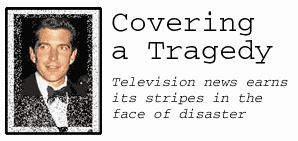
| ||||||
|
|
||||||
|
JULY 19, 1999
| FEATURE
ALSO THIS MONTH
LAST MONTH |

GREGORY J. ROBB
July 18, 1999: approximately 9:45 pm EDT: The announcement that the search
and rescue operation for the missing occupants of John F. Kennedy Jr.'s plane off
the Massachusetts coast turns into a search and recovery operation. From
rescue to recovery; from hope to despair; from survival to death. And in the
24-hour CNN coverage of the Kennedy crisis of 1999, we learn again (as we did
with its coverage of Princess Diana's death) that television news has become the
most immediate visual medium of our time. Special broadcasts of Larry King Live all weekend, while the search was on to
rescue the crash victims, and CNN's premier resources made us feel like we were
all but inside the Kennedy compound at Hyannisport. Reporter Chris Black, a
veteran of New England journalism, blitzed down from her vacation home near the
Kennedy compound to join such a large gathering of reporters that, she noted,
local officials had to provide extra power to accommodate all the newly-arrived
satellite transmission trucks. It seemed only fitting, as well, that the press
conference in which the word "recovery" replaced "rescue" (the abandonment of
hope for survivors) aired during a special edition of Larry King Live. It is in
covering this nature of breaking news that CNN is truly a world leader. The immediacy of the reporting matches the drama of another Kennedy tragedy.
During the first night of the search and "rescue", CNN's Chief International
Correspondent Christiane Amanpour chose to reveal a friendship which she and John
F. Kennedy Jr. shared from their days of partying in the distance between their
neighboring college campuses. Little did the vast majority of us know of such a
relationship before the tragedy of loss prompted Amanpour's extremely reverent
memories of the man whom the world was beginning to mourn. The potential of
America mourning the loss of yet another of the Kennedy clan moved one of the
world's top reporters to tell us what she did not need to tell us. Day Two, the final day, of the search and "rescue" was covered more
dramatically with cameras shooting pictures in various areas of the country.
Larry King had flown to Washington overnight from Los Angeles; as mentioned,
reporter Chris Black was on the scene at the Kennedy compound; King's guests
included Reverend Jesse Jackson in Chicago; and in moments eerily reminiscent of
the Diana and John Lennon deaths, CNN brought us pictures of New Yorkers laying
flowers, poems, notes and American flags on the steps leading into John F.
Kennedy Jr.'s apartment building. Add to that the press conference which
announced that "recovery" had replaced "rescue", and CNN had brought us the world
in one hour. At times like this, pure journalism is produced. Major American networks all
had their reporters at the same location outside the Kennedy compound in
Hyannisport, Massachusetts; not all the major American networks could so easily
bring us the non-stop coverage that CNN did. Other networks have to cut in to
regular programming - which isn't a problem. But at some point, they have to
consider when to return to those shows. Since CNN is a 24-hour news network, the
nature of its mandate is to live the story as the story lives. When Larry King
finished, he threw it back to the newsroom and those stations who returned to
regular programming had to monitor the story off-air. In the Princess Diana tragedy, most American news organizations found
themselves simply broadcasting, with permission, the BBC's emergency coverage.
Technology has made it so that we can be right at the scene from our own living
rooms. Less "film at 11", more substance now. Sometimes pure substance can be overwhelming. I couldn't help but feel like
all Americans who watched the CNN coverage sighed and lowered their heads in
agony as U.S. Coast Guard Rear Admiral, Richard Larrabee, announced that
officials would now try to figure not only what happened, but how it happened;
the search for the victims and parts of the plane has begun. The power of news has again pronounced itself
as, in the coming days or weeks, viewers will watch for information on the
Kennedy crash of 1999. But they'll never be the same after this night.
GREGORY J. ROBB, a high school English teacher, gained communication experience in radio, television and print. He is the staff television writer for Renaissance Online Magazine. |
|||||
 |
||||||
|
Full Issue Contents | FEEDBACK | Questionnaire | Archive | Free Subscription |
||||||

